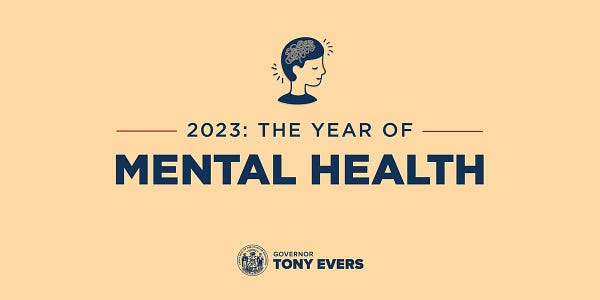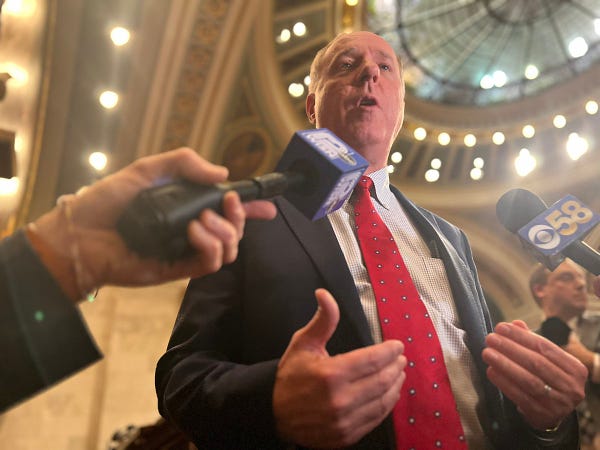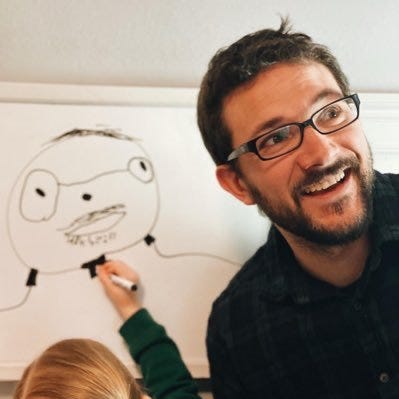Tony Evers' "State of the State" speech focuses on needed action, not divisive partisanship
The speech from Wisconsin's governor prioritized issues like mental health, education, water contamination, workforce development, local government and child care. Not exactly a "hot button" speech.
The Recombobulation Area is a six-time Milwaukee Press Club award-winning weekly opinion column and online publication written and published by veteran Milwaukee journalist Dan Shafer. Learn more about it here.

Gov. Tony Evers delivered his fifth “State of the State” address on Tuesday night, the first of his second term.
It was a speech that seemed to speak to many of the kitchen table issues of the 2020s. Top areas of focus included education, mental health, PFAS contamination, shared revenue and local government, workforce development, and child care.
There’s a lot of potential common ground within these proposals. This is far from some sort of “liberal wish list” type of speech. Even in comparison to what’s being proposed in neighboring states with Democratic governors, it seems pretty moderate.
But by emphasizing these kinds of middle-of-the-road issues, Evers appears to be setting the stage for the debates to come in the year ahead. There’s the sure-to-be-contentious budget battle soon approaching, and that comes with a historic $6.5 billion budget surplus — which Evers mentioned several times. The focus from the governor appears to be on using the surplus to tackle key issues, not start political fights.
Evers could have approached this speech differently, seeing as he won a “Wisconsin landslide” victory to be re-elected for a second term, perhaps outlining some priorities in more contentious areas, but this speech really zeroed in on nuts-and-bolts issues that not only should get done, but in many cases need to get done.
Issues like addressing PFAS contamination or expanding investment in workforce development programs aren’t going to be the types of big, splashy issues, but that’s not the type of governor that Tony Evers is and has been. He’s not trying to reinvent the wheel with any of what he’s proposing, but much of it is the type of smart, under-the-hood work that can, if done right, be genuinely beneficial for the state.


The biggest area of emphasis in the speech was on mental health, with the governor proclaiming it to be the “Year of Mental Health.” Previous declarations of this nature included the “Year of Clean Drinking Water” (in 2019) and the “Year of Broadband Access” (in 2021). It’s clear that the Evers administration will be making this a major priority in the coming year.
“The state of mental health in Wisconsin is a quiet, burgeoning crisis that I believe will have catastrophic consequences for generations if we don’t treat it with the urgency it requires,” Evers said in his speech.
This prioritization happening now in 2023 – with the worst of the covid-19 pandemic behind us but its effects still very much being felt – is an important and needed step. The proposal is substantive in its potential investment – $500 million, including more than $270 million for children, which includes making the student mental health program “Get Kids Ahead” a permanent state program.
In total dollar figures, these mental health programs encompassed the largest investment being proposed in the speech. Next highest was in child care, including $340 million for the Child Care Counts program, $30 million in tax relief through expanding the Child and Dependent Care Credit, and $22 million for partnerships between employers and child care providers. Every parent knows how sorely this is needed in Wisconsin. Evers said it in the speech – “54% of Wisconsinites today live in a child care desert where there are few to no high-quality options for child care in their neighborhood or community.”


And then, another issue of priority – one certainly connected to child care, but with many other factors in play – is workforce. It’s been a big topic lately for politicians in Wisconsin, talking in a variety of ways – some of them rather confounding, like weirdly focusing on the permanent residence of snowbirds – to address the lack of population and economic growth in the state. Republicans are pushing a flat tax to address this problem. No one meets a problem with more problems like Wisconsin Republicans. Never mind that this is a problem they themselves caused. But I digress.
Evers addressed this plainly: “Spending billions on a flat tax isn’t a workforce plan or an economic development plan.” He even called their plan “a bit reckless,” which, for the mild-mannered former science teacher that is Tony Evers, is a pretty fiery comment.
Instead of backing the Republican plan to cut taxes on the wealthy, the governor outlined a three-pronged economic development approach: “We need to bolster the middle class; we need to maintain our economy’s momentum; and we need to reduce barriers to work and recruit and retain talent to address our state’s workforce challenges.”
His pandemic aid uniquely emphasized small business and “Main Street” recovery, spending more federal relief funds on economic development than any other state – by a significant margin – and he plans to continue those efforts. He highlighted some success on that front, too.

“Since 2019, we’ve seen significant increases in business start-ups,” Evers said in the speech. “New business formations increased to more than 71,000—that’s a 42% increase between 2019 and 2021.”
He talked about success in investing in a variety of workforce development initiatives, including $100 million for the Workforce Innovation Grant program. He talked about successes in areas like job training and the Registered Apprenticeship program and growth in other more blue collar jobs. He also talked about investments in the healthcare industry, including $50 million to boost the health care workforce, particularly with long-term care providers, mental health providers and nurses.
And one issue we’re always paying attention to here at The Recombobulation Area is local government, and in this case, that means shared revenue. Evers proposed to send more money back to municipalities by directing sales tax back to local governments.
“I’m announcing tonight that I want to work together on a budget provision that will send a total of up to 20% of the state’s sales tax revenue back to our local communities for shared revenue,” he said.
There were a number of areas Evers did not address in as great of detail. He didn’t talk about Medicaid expansion or the state’s stark racial disparities. This wasn’t a speech that spent much time on abortion. Even popular policies that often came up during his first term, like marijuana legalization or universal background checks, weren’t specifically mentioned. We didn’t hear about LGBTQ rights or voting rights or public transportation. He talked about PFAS, but not lead pipes. There were some misses, to be sure. This isn’t (and can’t be) a speech for every last thing, after all.
But on the whole, this is a very good place to start for Evers – as a decidedly nonpolitical message. Issues like water contamination or funding local government or child care deserts are not especially divisive topics. There are plenty of worthy political debates to be had about how to get results on these issues, but there aren’t many “hot buttons” here.
In his second term, Tony Evers really has an opportunity to make his mark on the state of Wisconsin. What that means at this stage, it appears, is that he would like to see some of these impactful, long-ignored, middle-of-the-road problems to be meaningfully dealt with in a significant way.
That might be just what Wisconsin needs right now. That approach is almost certainly why Tony Evers won again.
The irony of Evers’ time as governor, though, is that he seems like he just wants to be a do-er, but he’s stuck dealing with this Republican-controlled state legislature that has been committed to obstruction and chaos at every turn. For a swing state, this group of legislative Republicans is especially far to the right, and has never at any moment shown a willingness to compromise and work with the Democratic governor or legislative Democrats, often breaking all kinds of governing norms along the way (like refusing to acknowledge hundreds of gubernatorial appointments and spending the better part of two years spending millions on investigations to say that certain votes don’t count).
And, of course, even before the speech, Assembly Speaker Robin Vos was saying that he’d throw out the governor’s proposed budget, told reporters immediately after the speech that most of these proposals are “DOA,” and even going so far to say this, as quoted by Jessie Opoien at the Cap Times:
“He didn't really spend much time talking to the whole room. He spent the entire time talking to liberal Democrats and the base statewide. And I think that's a sad commentary, because we have been trying to be genuine and saying, let's find common ground. But pretty much tonight it was throwing red meat to an awful lot of his base."
The Assembly Speaker is criticizing the governor here for something he very clearly – and perhaps very purposefully – did not do. Tony Evers absolutely did not make this a fire-up-the-base speech. Over and over, he said the word “together” when outlining how these problems could be solved. This was a speech about common ground and taking action.


Vos is running reruns on statements like this at this point. He spends the legislative offseason giving interviews about working together, and then at the first moment he can, runs away from those commitments. We in the media really need to stop taking the Assembly Speaker’s hollow pledges of bipartisanship seriously, considering how many times we’ve seen this show.
But what we should be doing is discussing Evers’ proposals on their merits. Let the people decide which ideas are best. Is it better to address mental health challenges, invest in child care, fix a broken shared revenue formula and clean contaminated water, or is it better to give a massive tax cut to the wealthy? People should be presented with those kinds of options and then have their voices heard as the discussion unfolds.
Ultimately, this speech is quintessential Evers: Nothing flashy, nothing overtly political, stridently on the issues. These aren’t grandiose promises, they’re plans for move-the-chains governing. The state would benefit from an earnest discussion of what Evers proposed in this “State of the State” speech.
Read the full speech here, and watch the full speech below.
Dan Shafer is a journalist from Milwaukee who writes and publishes The Recombobulation Area. He previously worked at Seattle Magazine, Seattle Business Magazine, the Milwaukee Business Journal, Milwaukee Magazine, and BizTimes Milwaukee. He’s also written for The New York Times, The Daily Beast, Heartland Signal, Belt Magazine, WisPolitics, and Milwaukee Record. He’s won 13 Milwaukee Press Club Excellence in Journalism Awards. He’s on Twitter at @DanRShafer.
Subscribe to The Recombobulation newsletter here and follow us on Facebook and Instagramat @therecombobulationarea.
Follow Dan Shafer on Twitter at @DanRShafer.



